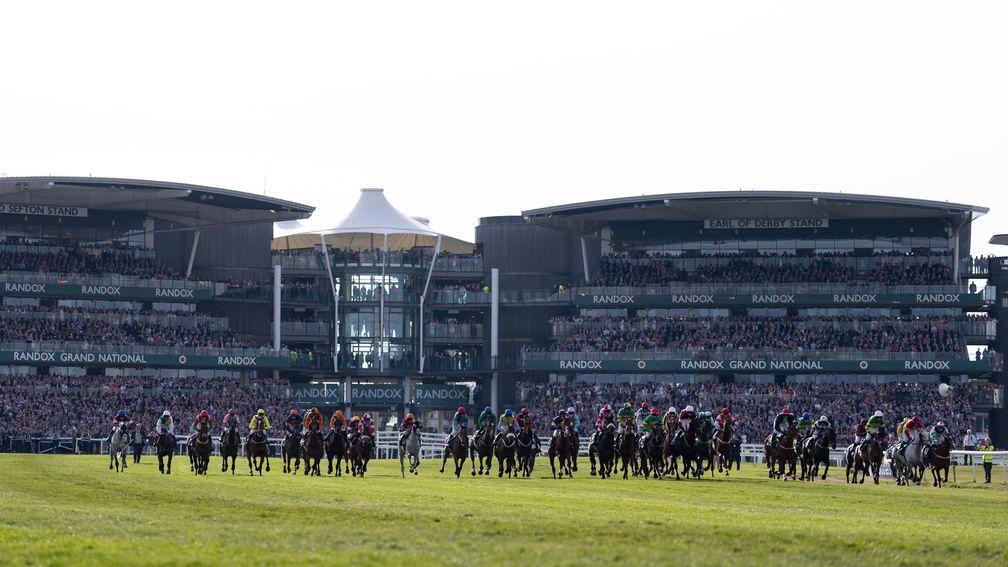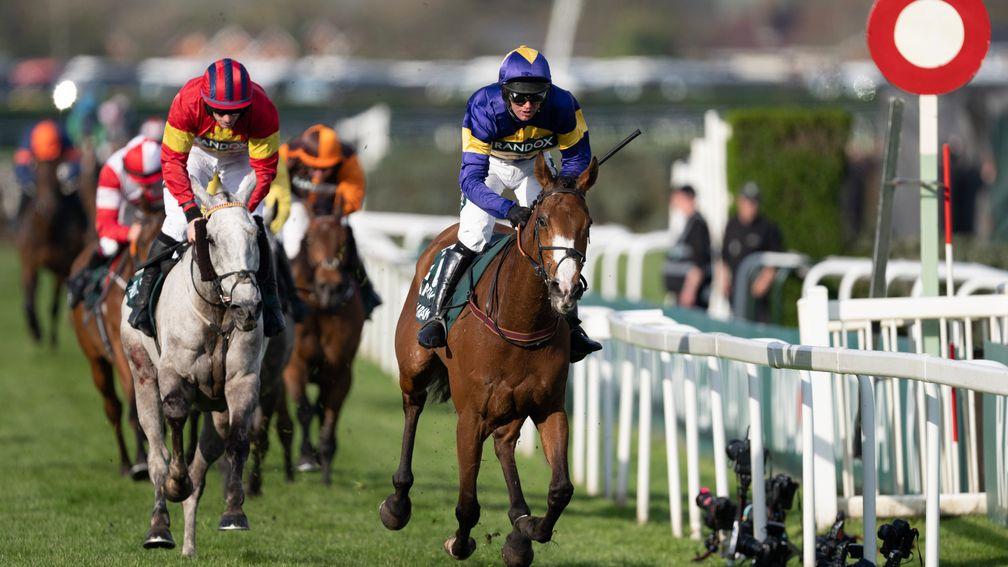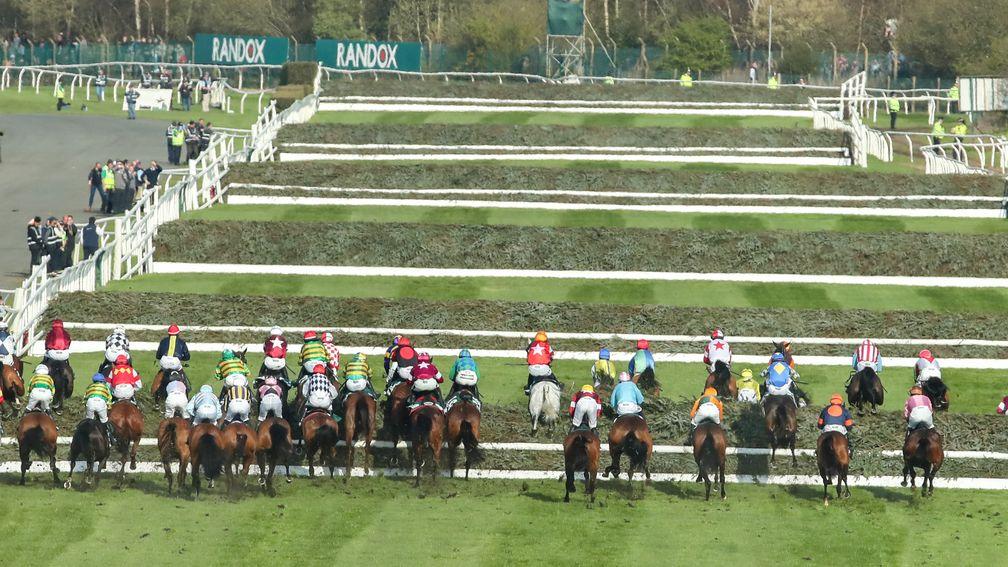Grand National legends back field size reduction as Aintree unveils major changes to big race

Ruby Walsh and Barry Geraghty led a chorus of support from across racing for significant changes set to be made to the Grand National, with Geraghty saying they were necessary for the sport "to protect one of our flagship races".
Geraghty, who partnered Monty's Pass to win the 2003 running, was joined by fellow Grand National winners Walsh and Lucinda Russell in praising the steps taken by Aintree and its owner, the Jockey Club, to promote the safety of participants competing over the National fences.
The headline changes to the £1 million contest include reducing the number of runners to 34 from 40, moving the first fence 60 yards closer to the starting line and altering the start so that all horses are standing, rather than walking, when the race begins.
Geraghty said: "You have to compliment the Jockey Club and Aintree for continuing to keep horse welfare a priority in making these changes. Reducing the number of runners is not going to suit everyone but you can see where they are coming from.

"All three changes are positive ways in which the early pace of the race can be reduced. The National is such a spectacle and if these modifications have to be made to keep it, then they are very important, as we need to protect it as one of our flagship races."
Walsh said he believed the proposed changes "will enhance the Grand National as a horse race and help to ensure its future". He hoped they would reduce bunching of runners on the inside of the course, a notable feature of this year's race.
The winner of Nationals aboard Papillon and Hedgehunter, he added: “The slower you go, the safer things are. Horses are competitive and will race each other but these changes should help to slow down both horse and rider.
"You hope small things make for big progress. A lot of thought and effort has gone into this process. It was a proper and thorough review.
"There are lots of people who don't like change but all sports change. Soccer is not the same game it was 30 or even 15 years ago and looking at the Rugby World Cup, rugby has had to evolve. Racing is the same, in that we have to evolve to ensure the future of the sport."
Weeks of controversy followed the latest running of the Randox-sponsored race in April, which was delayed for 14 minutes when animal rights activists mounted an unprecedented course invasion. Merseyside Police made 118 arrests on the day. Asked for an update this week, a spokesman said no-one had been charged, although an investigation remains open.

- In full: the key changes to the Grand National at Aintree
- Down the years: the long history of safety-related improvements to the Grand National at Aintree
- Comment: The wrong change at the wrong time - Grand National alterations will leave its enemies emboldened
- Reaction: 'The most important thing is the race itself' - Tom Scudamore backs Grand National changes
- Reaction: 'It makes sense to me' - Hill Sixteen trainer Sandy Thomson backs changes to big race at Aintree
Nevertheless, significant changes will come as a surprise to many, with some dissatisfaction expressed among racing fans about how the alterations are potentially undermining the race's unique status and appeal and making it harder to distinguish from other long-distance chases.
Explaining the decision to reduce the National field size from 40, Aintree's clerk of the course Sulekha Varma said: "We know from research papers and internal analysis of jump races that there is a direct correlation between the number of runners and the risk of falling, unseating or being brought down. However, we also must consider that reducing the field size by too great a number could create a faster race and have an adverse impact in terms of safety."
Had the changes been made just three years ago, we would still be waiting for the first female jockey to ride a National winner. Minella Times carried number 35 when he prevailed under Rachael Blackmore in 2021.
The race is to be started earlier in the afternoon, following several years in which it went off at 5.15pm, to guard against the possibility of the course drying out. The revised off-time has yet to be determined and ITV is to be involved in the discussion.

Runners will not be led by their grooms through the pre-race parade, handlers being required to release their charges at the end of the walkway to the track. The emphasis is now on allowing horses "to prepare for their race in their own time" but they will still be expected to canter in front of the stands before going to the start.
There will be changes to the inside running rail to assist with early capture of loose horses and fence 11 is to be reduced in height by two inches, while the landing-side drop will also be reduced. Foam and rubber toe boards will be fixed to every fence, paddock walkways will be widened and there will be further investment in the watering system.
Finally, the Grand National review panel, which assesses each entrant for suitability, is to be asked to apply a particular focus to those horses noted as having made jumping errors in four or more of their previous eight races.
The Jockey Club denied these changes were prompted by April's animal rights invasion. A spokesman said: "We undertake a review after every Grand National and constantly make changes as a result of this evidence-based process, which is all part of our relentless focus on putting the care and safety of our horses and jockeys above all else. The reckless actions of those who breached security to illegally gain access to the track on Grand National day have had absolutely no bearing whatsoever on the changes we are making to the race."
Lucinda Russell, who has trained the National winner twice in the past six years, said she was "fully supportive" of the decision to cut the number of runners. "I don't feel that six fewer runners will make a difference to the heritage of the race. It can only be a good step and hopefully will help improve the start procedures.
"As regards moving the first fence, the further you go then the more speed you are going to pick up, so, logically, it should mean they approach it slower. I know it's tricky for the jockeys to manage their speed as it's such an important race and everyone is vying for a good position."
Davy Russell, who partnered Tiger Roll to back-to-back wins in 2018 and 2019, also approved of the majority of the changes made to the Grand National, including the removal of horses being led by their grooms in a parade in front of the stands, but said he was unsure about reducing the number of runners.
"There are plenty of positives there and it's like a jigsaw in that all the parts will have to fit for it to work," he said. "Losing the parade is a good thing and shortening the run to the first is fine. I'm not entirely convinced of the standing start as it's going to be different for the horses. I think horses should stick to what they are used to doing so I'm not sure a standing start would be of much benefit, but we'll have to see it.
"I think taking six horses out is a big number. Maybe they could have started with taking out two but it's all bits of the puzzle and all put together, they could make it easier on the horses and riders."
Surprisingly, the Jockey Club also sought and received an approving comment from the RSPCA's Emma Slawinski, who has repeatedly called for an end to use of the whip for encouragement in racing. She said: "We are very pleased to see [the Jockey Club] taking horse welfare seriously and making changes to the Grand National as a result.”
Read these next:
118 arrested as 2023 Grand National delayed after animal rights protesters storm track at Aintree
'They haven't got a bloody clue' - Sandy Thomson blames 'ignorant' Grand National protesters
Racing Post Members' Club: 50% off your first three months

The jumps season is coming! Pick up your copy of The Big Jump Off, packed with everything you need for the 2023-24 National Hunt season. Free in the Racing Post on Monday, October 23, 2023, it's got 72 pages of unbeatable content including ante-post tips, guest columnists, top trainer profiles, divisional analysis and much more. You can pre-order your copy from the Racing Post shop here.
Published on inGrand National festival
Last updated
- Grand National 2025: date, preview and best bets
- 'I'd love to have a crack at the Grand National' - Flooring Porter team weigh up Aintree following Listowel heroics
- 'They had no chance and kept others out' - Davy Russell believes qualifying races for the Grand National should be introduced
- Bookmakers report Grand National turnover as 'flat' compared with last year
- 'It's a different feeling, it's unique, it's the Grand National' - Aintree hero I Am Maximus gets a huge homecoming welcome
- Grand National 2025: date, preview and best bets
- 'I'd love to have a crack at the Grand National' - Flooring Porter team weigh up Aintree following Listowel heroics
- 'They had no chance and kept others out' - Davy Russell believes qualifying races for the Grand National should be introduced
- Bookmakers report Grand National turnover as 'flat' compared with last year
- 'It's a different feeling, it's unique, it's the Grand National' - Aintree hero I Am Maximus gets a huge homecoming welcome